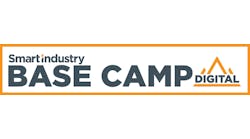A look back at the 2018 Smart Industry Conference
Day 1: Kicking off, diving in
The 2018 Smart Industry Conference kicked off with tours of three local facilities capitalizing on digital capabilities. One shuttle headed east to the Digital Manufacturing and Design Innovation Institute, a showcase for modern machines and the thought-leaders who operate them. Another bus headed to the Alter Brewing Company, where the relationship between data and beer was explored. And the last group traveled to the TRUMPF Smart Factory to see advanced metal-fabricating machines and their respective digital twins.
Presentations followed a networking lunch. After some introductory remarks by Smart Industry VP of Content Keith Larson that explored the growth of digital transformation in parallel to this fourth-annual conference, Spencer Stuart’s Suzanne Burns took the stage to explain how changes within enterprises’ work culture must precede successful digital transformations. She described workplace culture as the unspoken rules that have a massive, underestimated influence, particularly during the implementation of new digital strategy.
Next up was the panel discussion “Organizational Transformation in an Age of Information Abundance,” during which the IoT Talent Consortium’s Trent Salvaggio moderated Marie Getsug of Jacobs Engineering Group, Mahyar Khosravi or Canvass Analytics and Hicham Wazni or Arconic. All on the panel agreed that, during this period of unprecedented access to data, it is the insights that can be gleaned from that information that is the real goal of digital-transformation efforts.
"Have you seen major changes driven by this new access to information?” asked Salvaggio.
Khosravi responded that, with his enterprise’s reliance on Artificial Intelligence, data is critical. “You can’t do AI without a lot of information,” he said. “The problem is the human brain’s capacity to process that data.”
Wazni detailed his team’s hiring of data scientists to help process the mountains of data they are now producing, and the challenge of folding those new hires into the corporate culture. And Getsug stressed the importance of properly aligning digital-transformation tactics with one’s digital transformation strategy.
After a short break, Air Liquide’s Arnold “Marty” Martin presented on the impact digitalization (or “IoT-ization”) has on the customer relationships. Next, AGCO’s Peggy Gulick wowed the crowd with the breadth of her enterprise’s digital-transformation projects—augmented reality, Google Glass, Artificial Intelligence, etc. She elicited laughs when she admitted that, during early efforts at AGCO, “We didn’t know we were doing the Internet of Things, but we were.”
Day 1 concluded with cocktails and speed-networking, enabling attendees to connect with peers, potential partners and old friends, exchanging business cards after a full day of exchanging ideas.
Day 2: Recognizing trends, honoring the trend-setters
The second day of the 2018 Smart Industry Conference picked up where the opening day left off, with a deep dive into trending topics.
Jason Anderson, vice president of business line management with conference presenting sponsor Stratus Technologies, delivered “A Push Towards the Network Edge: A Stepwise Approach to Digital Transformation,” during which he detailed how prevalent (and growing) IoT devices are in the manufacturing space, and how trend this is helping to realize the benefits of edge computing.
During the following plenary session, Intel’s Faith McCreary and Irene Petrick explored how people, process and technology must come together to achieve comprehensive success in this digital era. “Transformation is not a luxury, it’s an imperative,” said Petrick to a room of nodding heads.
A full afternoon of breakout sessions followed, organized in tracks focused on performance, process innovation and prescriptive maintenance. Topics ranged from data analytics within breweries to data infrastructures, oil-and-gas automation to the economy of scale, remote monitoring, weaponized IoT devices and RxM case studies.
In place of an afternoon plenary presentation, conference-goers engaged in topic-focused networking during 20-minute roundtable sessions. The small-group format prompted a lively exchange of ideas on product-data management, predictive analytics, connecting legacy machines and a host of other issues facing this crowd.
Harbor Research Consultant Harry Pascarella delivered the final presentation of the day, addressing the importance of ecosystem design in the age of digital and smart systems. “Relationships will get closer as systems get more complex,” he noted.
Finally, before the networking cocktail hour, the 2018 class of The Smart Industry 50 were honored. Professionals from disparate fields, with diverse titles and backgrounds, were celebrated by their peers as they joined this elite collection of digital-transformation pioneers.
Day 3: Influential women, secure systems and proper pricing
What’s left to learn on Day 3 of the Smart Industry Conference? Plenty.
Breakfast sessions started the day. In one room, Jason Andersen of presenting sponsor Stratus Technologies provided a personal case study that he described as “A behind-the-music tour of how we figured out our approach to cybersecurity.” The trick is rethinking the entire infrastructure. The IT approach to “this edge thing,” he said, is not the right approach.
Nearby at the other breakfast session, the inaugural class of the Influential Women in Manufacturing was celebrated with a series of inspiring presentations. This collection of professionals includes executives and engineers, scientists and technology directors from a spectrum of fields. This they have in common: they’re doing exceptional work in Industry 4.0.
Plenary sessions followed, with Accenture’s Brian Irwin providing tips for leveraging new, digital business models for growth. Some 70% of the value in a product can derive from the service and digitalization of it, he opined. In the second morning plenary presentation, Simon-Kucher & Partners’ Adam Echter explained how the increased complexity of modern manufacturing is changing the way products are monetized.
Conference-goers then broke off into smaller sessions focused on accelerating product development and maintenance analytics, 3D printing and machine learning.
All then gathered for one last luncheon session hosted by Haresh Malkani of the Clean Energy Smart Manufacturing Innovation Institute, who shared his perspective on the democratization of smart, sustainable manufacturing. “Everyone is beginning to see this journey the same way,” he said in his opening remarks, which was particularly true to the digital-pioneers in the audience.
Gratitude and eyes on the future
We'd like to thank the speakers, exhibitors and attendees who gathered with us to communally explore the many facets of this thing we call digital transformation. Particular thanks goes to our presenting sponsor Stratus Technologies.
There are many challenges ahead of us. There are great rewards to be won. This much is certain—we will overcome those challenges and reap those rewards with more speed, grace and confidence if we're working together.


